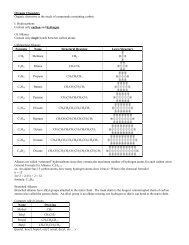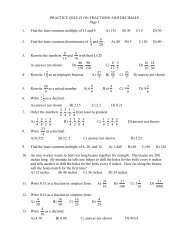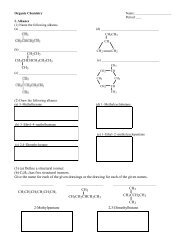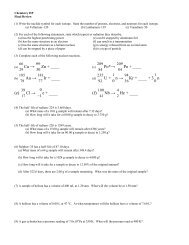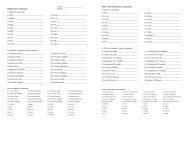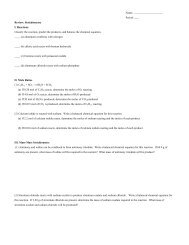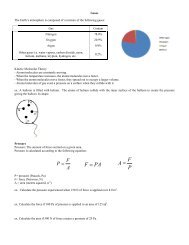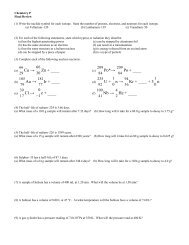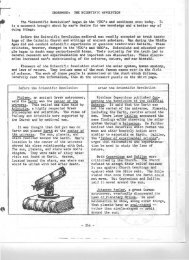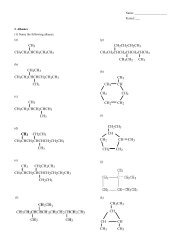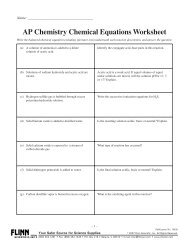Economic Ties – The US and Britain had big time trading/banking links, and since internationallaw allowed for trade of both contraband and n/c materials between neutral and belligerentnations, it was up to Germany to stop trade through a blockade or something. Wilson opposedthe trade at first, but ended up conceding as it was essential to US economic health. Ideological Similarities – Wilson also favored Britain b/c he believed that British supremacygave his principles more of a chance. Wilsonianism consisted of traditional <strong>Am</strong>erican ideals[democracy, Open Door], internationalism, and <strong>Am</strong>erican exceptionalism – i.e. US as worldleader in an era of capitalism, democracy [self-determination and the destruction of empireswere big factors too] and diplomacy.- Wilson still didn’t want to go to war, and attempted to preserve neutrality – for a while…*Wilson’s Decision for War*- First, a series of events got Wilson and co. to start considering the question… Lusitania incident – In May 1915 the British passenger liner Lusitania was sunk by a Britishsubmarine, killing 128 <strong>Am</strong>ericans. *Note: The Germans HAD issued a warning that Britishvessels could be destroyed, but nobody listened. Bryan’s resignation – Bryan suggested that <strong>Am</strong>ericans be forbidden from traveling onbelligerent ships and that contraband not be allowed on passenger vessels, but Wilsondisagreed and insisted the Germans stop their sub warfare [he claimed it wasn’t a doublestandard b/c the Germans were taking lives, not property]. Bryan resigned in protest, andRobert Lansing [pro-Allied] took his place. Gore-McLemore Resolution – After the sinking of the Arabic in early 1916 Congress debatedthis resolution, which would have prohibited <strong>Am</strong>ericans from traveling on armed merchantvessels or ships w/contraband. But, the resolution was eventually killed off. Sussex incident – Another U-boat attack led Wilson to threaten Berlin w/the severance ofdiplomatic relations. The Germans promised not to do it again.- Not everyone, of course, went along w/the pro-war position. Anti-war groups included the: Woman’sPeace Party, <strong>Am</strong>erican Union against Militarism [pacifist Progressives], Carnegie Endowment forInternat’l Peace [Carnegie & Ford were both anti-war] and the Socialist party.- The anti-war advocates were big on the fact that war: (1) kills young people, (2) fosters repression, (3) isnot moral [no kidding] and (3) lets business moguls make big $ at expense of the little guys.- In 1916, in fact, even Wilson claimed to be anti-war, running [and winning] the Presidential Election of1916 on a promise to keep out of the conflict. In early 1917, he tried one last time to bring peace via aconference table, but it didn’t work.- The straw(s) that broke the camel’s back – the two major short-term causes were: Germany started unrestricted sub warfare, gambling that it could wipe out the Allies before theUS could bring troops across to Europe.The Zimmerman Telegram was intercepted in February 1917. The telegram asked Mexico tojoin an alliance against the US in exchange for help recovering territories lost in the Mexican-<strong>Am</strong>erican war. Naturally, this didn’t go over too well w/Wilson, and it went over even less wellwith the press once it was released.- Wilson first asked for “armed neutrality,” but anti-war Senators filibustered the bill out, so Wilson ended upcalling Congress into special session on April 2, 1917. After naming US grievances [violation of freedom ofthe seas, disruption of <strong>com</strong>merce, the Mexico deal, etc.], Wilson finally got his declaration of war passed.So, brimming w/idealism [Wilson planned to reform the world], we entered WWI on April 6.*Winning the War*- E/t anti-war Senators had tried to prevent it the US had been getting ready for war even before it wasdeclared through acts like the National Defense Act of 1916 and the Navy Act of 1916, which provided forthe largest naval expansion in US history.- After the declaration of war, Congress passed the Selective Service Act, requiring all males between 21and 30 (changed to 18 and 45 later) to register. Critics felt the measure would lead to excessive militarism,but supporters countered that it would lead to good, healthy patriotism.- Most draftees were white, poorly-educated <strong>Am</strong>ericans in their early 20s – some African <strong>Am</strong>ericans signedup and were assigned to segregated units [they faced a lot of discrimination in the army too] and Native<strong>Am</strong>ericans joined as well. There were some draft evaders, and many filed in as conscientious-objectors.- <strong>Am</strong>erican organizations like the Commission on Training Camp Activities, etc. attempted to keep soldiershealthy and moral during the war, but soldiers faced trench warfare, poison gas, and the horrors of the newweapons technology.56
- Still, <strong>Am</strong>ericans managed to turn the tide against the Germans, esp. after the Allied victory in July 1918 atthe Second Battle of the Marne, which was followed by a huge Allied offense that forced Germany into anarmistice on November 11, 1918.*<strong>Am</strong>erica on the <strong>Home</strong> Front: Economic Change*- E/t the US wasn’t at war for long, the war [temporarily] created a vastly different society in which the gov’tspend a lot more money and exercised more control over the economy. Several important economicdevelopments resulted from WWI war production, as follows: Business-Government Cooperation – The war ushered in a new era of business/gov’tcooperation. Early on, the gov’t relied on industrial <strong>com</strong>mittees for advice on purchases/prices,but after they turned out to be corrupt in July 1917, the War Industries Board replaced them.Still, the WIB worked closely w/corporations, and big business grew due to the suspension ofantitrust laws and gov’t-industry contracts. New Gov’t Economic Agencies – As follows: War Industries Board – Headed by Bernard Baruch, the WIB coordinated the nat’leconomy by making purchases, allocating supplies, and fixing prices. It also orderedthe standardization of goods. Not all-powerful, though, b/c there had to be lots of<strong>com</strong>promising w/the big corporations. Food Administration – Led by Herbert Hoover, the FA had voluntary programs [likethe “victory gardens”] and other duties, like setting prices and regulating distribution. RRD Administration & Fuel Administration – Regulated their respective industries,fuel administration rationed gasoline as well. Boom Years for Farmers and Industry – One of the positive results of war production was thatit allowed farmers to get mechanized [due to high demand and high prices] and led to greatgrowth in some industries. Errors & Fuel Shortages – On the negative side, there were mistakes made due to the hecticpace of production and distribution, and there was a severe coal shortage which left many w/oheat in 1917-1918. Inflation – Increased buying [more demand than supply], liberal credit policies, and the settingof prices on raw materials rather than on finished products led to skyrocketing prices. New Tax Policies – To pay for the war, taxes went up through laws like the Revenue Act of1916 [raised tax on high in<strong>com</strong>es and corporate profits, added tax on large estates, andincreased the tax on munitions manufacturers] and the War Revenue Act of 1917 [morein<strong>com</strong>e and corporate taxes]. Liberty Bonds also contributed to gov’t in<strong>com</strong>es. Labor Shortage – Unemployment basically vanished and wages increased [though the costs ofliving did too]. People rushed into the cities and into manufacturing jobs. As a result of theshortage, strikes were strongly discouraged, and the National War Labor Board wasestablished in 1918 to coordinate management and unions. The AFL joined the NWLB, but theSocialists and IWW members still continued to agitate. Women in the Work Force – Women temporarily took over many male-dominated professions.Similarly, black women were able to take jobs formerly reserved to white women. After the war,however, women were displaced back into the home. African <strong>Am</strong>erican Migration to the Cities – New opportunities also appeared for blacks, andmale blacks rushed into the cities to take advantage of them, regardless of the discriminationthat persisted. This resulted in race riots through the “Red Summer” of 1919.- So, economically, the war brought increased gov’t involvement and a temporary boom in industry.*<strong>Am</strong>erica on the <strong>Home</strong> Front: Civil Liberties*- As soon as the war began, the gov’t also instituted control of rather a different sort – control of speech, andthe limiting of civil liberties. Anyone who refused to support the war faced repression from the gov’t, and theissue of free speech was seen as a question of policy for the first time. For example, there was the… Committee on Public Information – Headed by Progressive journalist George Creel, the CPIset about the making of propaganda through posters, films, pamphlets, speeches, and so on. Espionage Act (1917) – The EA forbade “false statements” against the draft or the military, andbanned anti-war mails. Sedition Act (1918) – The SA made it illegal to obstruct the sale of war bonds and to use nastylanguage against the gov’t, Constitution, flag, or uniform. It was very vague, and allowed forplenty of gov’t intimidation.57
- Page 3 and 4:
Congregationalists (Puritans) - The
- Page 5 and 6: - So the Restoration Colonies, form
- Page 7 and 8: - So in England, where they were lo
- Page 9 and 10: *Colonial Politics 1700-1750: Relat
- Page 11 and 12: - Another ideology that was beginni
- Page 13 and 14: - The Quebec Acts were passed aroun
- Page 15 and 16: - So, by 1782, what had seemed to b
- Page 17 and 18: on the economic side, since the gov
- Page 19 and 20: - Anyway, Congress had several ques
- Page 21 and 22: - Adams was still in the early Wash
- Page 23 and 24: *Political Factionalism and Jeffers
- Page 25 and 26: - Samuel Slater set up the first te
- Page 27 and 28: - Court rulings extended the powers
- Page 29 and 30: Revival, Reform and Politics during
- Page 31 and 32: - Anyhow, during his administration
- Page 33 and 34: TEXAS (Southerners) - Texas had bee
- Page 35 and 36: - Anyhow, Pierce’s total support
- Page 37 and 38: They had a smaller everything: smal
- Page 39 and 40: - The two Northern victories at the
- Page 41 and 42: - The result was the Fourteenth Ame
- Page 43 and 44: The Slaughter-House Cases (1873) -
- Page 45 and 46: in the arrest of 8 immigrant radica
- Page 47 and 48: case (1897 - ICC can’t set rates)
- Page 49 and 50: - The Populists prepared to run aga
- Page 51 and 52: - MOST IMPORTANTLY, though, was the
- Page 53 and 54: - So, what led the US to undertake
- Page 55: - The rebellion, led by Emilio Agui
- Page 59 and 60: - So - the point of this episode? B
- Page 62 and 63: *Hoover’s Response*- Poor Herbert
- Page 64 and 65: - In FDR’s second term, however,
- Page 66 and 67: Dominican Republic - When we left i
- Page 68 and 69: World War II (1941 - 1945)*The Cour
- Page 70 and 71: - So Truman started off again all c
- Page 72 and 73: - First of all, the 1950s were (for
- Page 74 and 75: peace w/Japan that ended occupation
- Page 76: - France wanted out, so at the Gene



